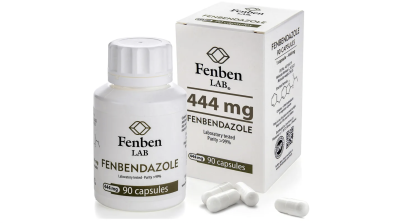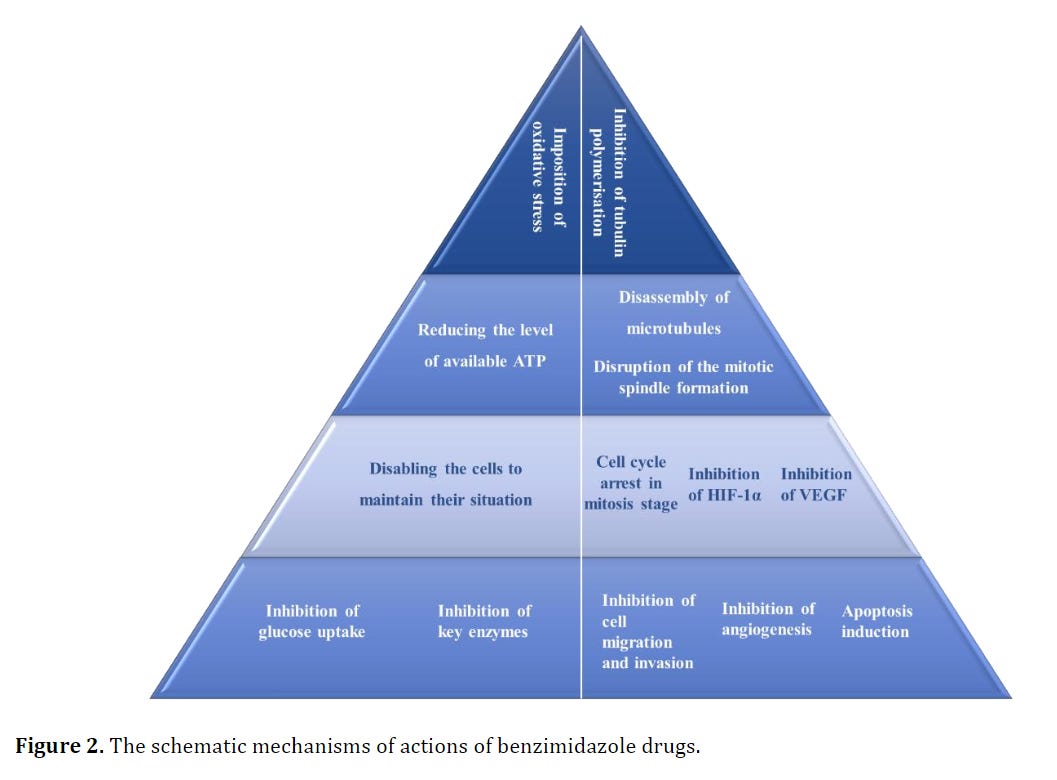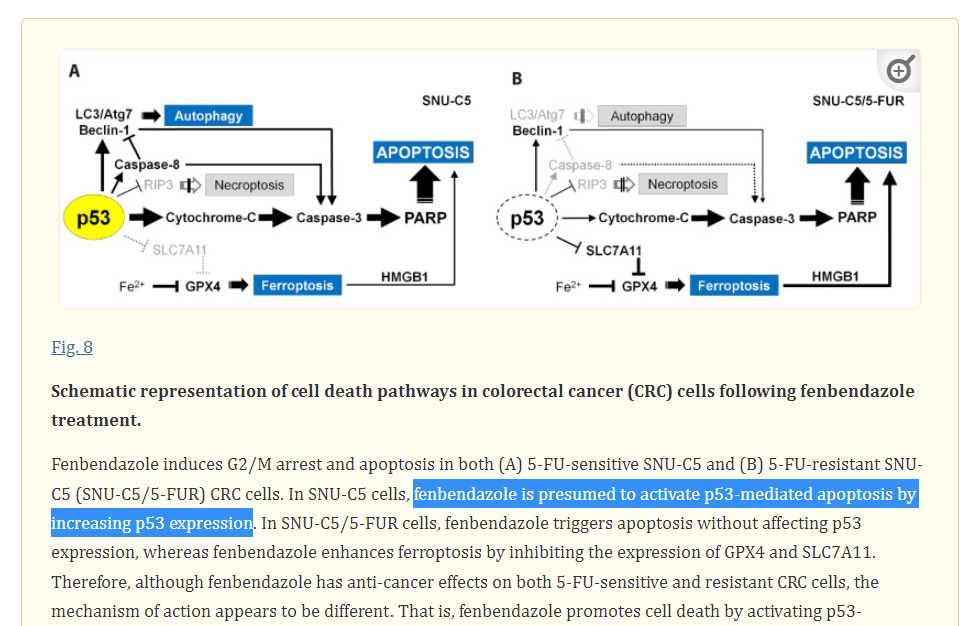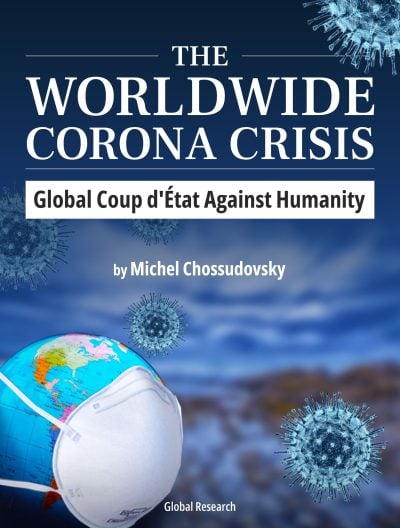Fenbendazole and Cancer: At Least 12 Anti-Cancer Mechanisms of Action. Not Approved by FDA. Cheap. Safe. Kills Aggressive Cancers. Why No Clinical Trials?
Nine research papers reviewed.

All Global Research articles can be read in 51 languages by activating the Translate Website button below the author’s name.
To receive Global Research’s Daily Newsletter (selected articles), click here.
Click the share button above to email/forward this article to your friends and colleagues. Follow us on Instagram and Twitter and subscribe to our Telegram Channel. Feel free to repost and share widely Global Research articles.
***

- These drugs inhibit tumor proliferation and growth
- many new benzimidazole derivatives have been developed for the treatment of cancers such as colon cancer, breast cancer, lung cancer, chondrosarcoma and leukemia
- Furthermore, new benzimidazole derivatives have demonstrated high capability for overcoming drug resistance
- benzimidazole drugs exhibit anti-metastatic effect through inhibiting cell migration and invasion
- benzimidazole drugs also suppress telomerase reverse transcriptase (TERT) expression, whose activation is associated with metastasis
- benzimidazole drugs are potent in targeting cancer stem cells and preventing tumor recurrence.
- benzimidazole drugs are also found to prevent the radiation-induced transformation of cancer cells into radiation-resistant cells, and furthermore sensitize some drug-resistant cells.
- Clinical trials are ongoing for cancer therapy with benzimidazole drugs.
- For example, clinical study of mebendazole as adjuvant treatment for colon cancer is in Phase 3 (NCT03925662)
- and mebendazole in combination with other antiprotozoal agents including albendazole for neoplasm therapy is in Phase 2 (NCT02366884).
- Three Phase 1 clinical trials are also ongoing for mebendazole and brain tumors (NCT02644291, NCT01729260, NCT0183787862).
- THERE ARE NO CLINICAL TRIALS WITH FENBENDAZOLE
- low water solubility of benzimidazole drugs impedes their clinical applications
- nano-formulations are being created to improve bioavailability
- benzimidazole drugs are also being combined with other chemotherapeutics, such as paclitaxel, trametinib, gemcitabine and methoxyestradiol, to enhance the anti-cancer treatment efficacy.
- benzimidazole drugs have also sensitized tumor cells to radiation therapy

2022 Jan – Li-wen Ren et al – Benzimidazoles induce concurrent apoptosis and pyroptosis of human glioblastoma cells via arresting cell cycle
- fenbendazole was tested against glioblastoma cancer cells
- 1. fenbendazole dose-dependently suppressed DNA synthesis
- 2. fenbendazole inhibited cell migration and invasion of GBM cells
- 3. fenbendazole also dose-dependently induced the GBM cell cycle arrest at the G2/M phase via the P53/P21/cyclin B1 pathway.
- 4. fenbendazole triggered pyroptosis of GBM cells (pyroptosis is a form of programmed cell death) through the NF-κB/NLRP3/GSDMD pathway
- 5. fenbendazole induced mitochondria-dependent apoptosis of GBM cells
- 6. flubendazole inhibited tumor growth of glioblastoma in vivo in a dose dependent manner (in a nude mouse U87 cell xenograft model)
- Conclusion: “Taken together, our results demonstrated that benzimidazoles might be promising candidates for the treatment of GBM.”
My Take…
Ivermectin is FDA approved.
Fenbendazole is NOT approved for human use by Food and Drug Administration (FDA) and European Medicines Agency (EMA). It is available as a veterinary medication.
Fenbendazole is part of a larger group of drugs known as benzimidazoles, which are anthelmintic drugs (i.e., drugs that kill parasitic worms). Another benzimidazole is mebendazole, which can be prescribed to humans with certain parasitic infections.
Mebendazole (Vermox) is FDA approved for human use, but it’s significantly more expensive.
Why is Fenbendazole so popular? The Story of Joe Tippens and his terminal Stage 4 Small Cell Lung Cancer.
Joe Tippens Cancer Protocol
- Fenbendazole 222mg per day with food (originally 3 days on, 4 days off)
- Curcumin 600mg per day
- CBD Oil: 25mg sublingually per day
- Vitamin E: 800IU per day
ACTIVE CANCER TREATMENT – For active cancer, take one capsule of Fenbendazole (444 mg) daily. Some people recommend you take one day off a week. Note: I think I would just take Sundays off. Again, you’re not supposed to develop a tolerance to this, but taking a little break is probably a good idea. To improve the protocol , take CBD oil (25mg) 1-2 drops every night before sleep. To strengthen the protocol take Curcumin (600mg) twice a day with food. To support the liver, take Milk Thistle (250mg) twice a day with food. Note: Fenbendazole should be taken with or after a meal to improve absorption.
COMPLEMENTARY CANCER TREATMENT – Take one capsule of Fenbendazole (222mg) every day, once a day after a fatty meal; Curcumin (600mg) one capsule, two times a day after breakfast and lunch; CBD oil (25mg) 1-2 drops under the tongue every day before sleep.
CANCER RELAPSE PREVENTION – Taking Fenbendazole for active cancer and cancer relapse prevention, take one capsule (222 mg) three times a week, once a day after a fatty meal.In addition, take Curcumin (600mg) one capsule/two times a day after breakfast and lunch, Milk Thistle, and CBD Oil (25mg) 1-2 drops under the tongue everyday before going to sleep. Note: Have your doctor follow and check liver and kidney function tests. It’s easy, cheap, and you can get this at any doctor’s office.
CANCER PREVENTION (prophylactic) – Those that have had genetic tests and know they’re really prone to getting cancer can take Fenbendazole prophylactically. Take one capsule (222 mg) 3 times a week, once a day after a fatty meal. Then no Fenbendazole for four days. Repeat for 10 weeks and then take 10 weeks off; Curcumin (600 mg) one capsule two times a day after breakfast and lunch; CBD oil (25mg) 1-2 drops under the tongue every day before sleep. Continue that regimen indefinitely.
My Thoughts
Fenbendazole is not that controversial when you consider the scientific evidence objectively.
Fenbendazole has at least 12 proven anti-cancer mechanisms in vitro and in vivo:
- disrupts microtubule polymerization (major mechanism)
- induces cell cycle (G2/M) arrest
- blocks glucose transport and impairs glucose utilization by cancer cells (major)
- increases p53 tumor suppressor levels (major)
- inhibits cancer cell viability (mTOR)
- inhibits cancer cell migration and invasion (EMT pathway)
- induces apoptosis
- induces autophagy
- induces pyroptosis and necrosis
- induces differentiation and senescence
- inhibits tumor angiogenesis
- reduces colony formation and inhibits stem-ness in cancer cells
- inhibits drug resistance and sensitizes cells to conventional chemo as well as radiation therapy
Conclusion
Although the anti-parasitic Fenbendazole is not FDA approved for human use, there is extensive evidence of anti-cancer effects in the published literature, both in vitro and in vivo, and this is not a controversial medication, as it has been made out to be.
Fenbendazole has an excellent safety profile and its close relative, Mebendazole is FDA approved, and it’s undergoing several Clinical Trials for Cancer Treatments in the US right now, including colon cancers and brain cancers.
I believe that it is a reasonable hypothesis that COVID-19 mRNA Vaccine Turbo Cancer patients could benefit significantly from either Mebendazole or Fenbendazole and I would love to see urgent clinical trials with both.
*
Note to readers: Please click the share button above. Follow us on Instagram and Twitter and subscribe to our Telegram Channel. Feel free to repost and share widely Global Research articles.
Dr. William Makis is a Canadian physician with expertise in Radiology, Oncology and Immunology. Governor General’s Medal, University of Toronto Scholar. Author of 100+ peer-reviewed medical publications.
 The Worldwide Corona Crisis, Global Coup d’Etat Against Humanity
The Worldwide Corona Crisis, Global Coup d’Etat Against Humanity
by Michel Chossudovsky
Michel Chossudovsky reviews in detail how this insidious project “destroys people’s lives”. He provides a comprehensive analysis of everything you need to know about the “pandemic” — from the medical dimensions to the economic and social repercussions, political underpinnings, and mental and psychological impacts.
“My objective as an author is to inform people worldwide and refute the official narrative which has been used as a justification to destabilize the economic and social fabric of entire countries, followed by the imposition of the “deadly” COVID-19 “vaccine”. This crisis affects humanity in its entirety: almost 8 billion people. We stand in solidarity with our fellow human beings and our children worldwide. Truth is a powerful instrument.”
Reviews
This is an in-depth resource of great interest if it is the wider perspective you are motivated to understand a little better, the author is very knowledgeable about geopolitics and this comes out in the way Covid is contextualized. —Dr. Mike Yeadon
In this war against humanity in which we find ourselves, in this singular, irregular and massive assault against liberty and the goodness of people, Chossudovsky’s book is a rock upon which to sustain our fight. –Dr. Emanuel Garcia
In fifteen concise science-based chapters, Michel traces the false covid pandemic, explaining how a PCR test, producing up to 97% proven false positives, combined with a relentless 24/7 fear campaign, was able to create a worldwide panic-laden “plandemic”; that this plandemic would never have been possible without the infamous DNA-modifying Polymerase Chain Reaction test – which to this day is being pushed on a majority of innocent people who have no clue. His conclusions are evidenced by renown scientists. —Peter Koenig
Professor Chossudovsky exposes the truth that “there is no causal relationship between the virus and economic variables.” In other words, it was not COVID-19 but, rather, the deliberate implementation of the illogical, scientifically baseless lockdowns that caused the shutdown of the global economy. –David Skripac
A reading of Chossudovsky’s book provides a comprehensive lesson in how there is a global coup d’état under way called “The Great Reset” that if not resisted and defeated by freedom loving people everywhere will result in a dystopian future not yet imagined. Pass on this free gift from Professor Chossudovsky before it’s too late. You will not find so much valuable information and analysis in one place. –Edward Curtin
ISBN: 978-0-9879389-3-0, Year: 2022, PDF Ebook, Pages: 164, 15 Chapters
Price: $11.50 FREE COPY! Click here (docsend) and download.
We encourage you to support the eBook project by making a donation through Global Research’s DonorBox “Worldwide Corona Crisis” Campaign Page.


